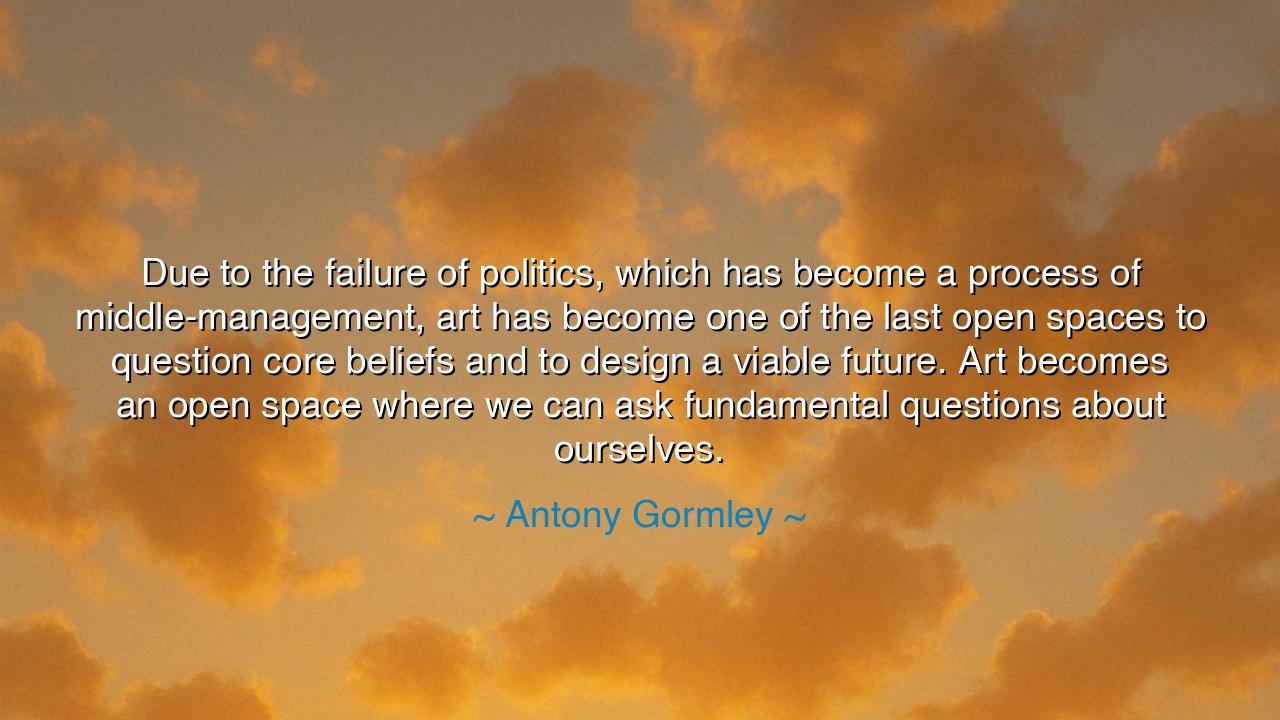
Due to the failure of politics, which has become a process of
Due to the failure of politics, which has become a process of middle-management, art has become one of the last open spaces to question core beliefs and to design a viable future. Art becomes an open space where we can ask fundamental questions about ourselves.






Hearken, O children of thought and vision, and attend to the words of Antony Gormley, the sculptor of consciousness and form, who proclaimed: “Due to the failure of politics, which has become a process of middle-management, art has become one of the last open spaces to question core beliefs and to design a viable future. Art becomes an open space where we can ask fundamental questions about ourselves.” In these words lies a meditation upon creation, inquiry, and the sacred role of art as a vessel for reflection and transformation. When politics falters, art endures as a domain of truth, courage, and the imagination of possibilities.
Since the dawn of civilization, mortals have turned to art to confront uncertainty, injustice, and the mysteries of existence. The painters of the Renaissance, the poets of the classical world, and the sculptors of ancient temples all understood that creation could illuminate truths that governance often obscured. Gormley’s insight echoes this eternal principle: when the machinery of politics stagnates, art becomes an open space to examine beliefs, question assumptions, and envision the futures we may yet create.
Consider the story of Francisco Goya, who, amid the political turmoil of Napoleonic Spain, created works that confronted brutality and human suffering. His “Disasters of War” series laid bare the horrors that authority ignored or justified, opening a space for reflection, outrage, and moral reckoning. Gormley’s words remind us that such acts of art are not mere decoration, but interventions—spaces where fundamental questions of humanity, justice, and responsibility may be asked.
The essence of Gormley’s meditation lies in courage and imagination. Politics, he observes, often becomes constrained by bureaucracy and compromise, a process of middle-management that limits visionary change. Art, in contrast, offers freedom: the liberty to question, to disrupt, to imagine alternatives, and to propose new modes of being. It is within this freedom that artists—like philosophers, sages, and seers of old—guide society toward reflection, self-knowledge, and possibility.
In another sense, Gormley’s insight teaches that art is inherently dialogic. Each creation invites engagement, interpretation, and introspection. The sculptures of Gormley himself, human forms standing, sitting, or lying in landscapes, confront viewers with questions of space, identity, and mortality. Through art, we are compelled to ask fundamental questions about ourselves, to recognize both the individual and collective dimensions of existence, and to participate in the envisioning of futures not yet realized.
O seeker, take this teaching into your own life: allow art, literature, music, and creation of all forms to be more than passive observation. Engage actively, reflect upon the questions posed, and let these inquiries shape your understanding of society, morality, and purpose. When political structures falter or become constrained, turn to the open spaces of creativity to explore truth, inspire action, and cultivate ethical vision.
Moreover, understand that art as inquiry is not limited to galleries or theaters; it extends to thought, discourse, and personal expression. Every act of creation, when approached with reflection, becomes a mirror of possibility, a probe into assumptions, and a call to imagine what is just, sustainable, and humane. Gormley reminds us that our engagement with creativity is both a personal and civic act, capable of shaping how we live and what we value.
Thus, Antony Gormley’s words endure as both guidance and meditation: when politics falters, let art be the domain of inquiry, reflection, and possibility. Question core beliefs, confront assumptions, and envision viable futures. Walk the world with awareness, engage in creation with courage, and allow the open spaces of art to illuminate both your inner life and the collective paths we may yet forge.
If you wish, I can also craft a short illustrative story showing an artist or thinker using art to question assumptions and inspire change, making Gormley’s philosophy vividly tangible for listeners. Would you like me to do that?






AAdministratorAdministrator
Welcome, honored guests. Please leave a comment, we will respond soon